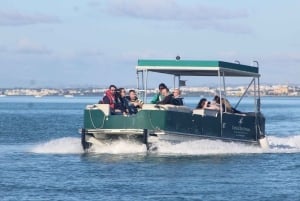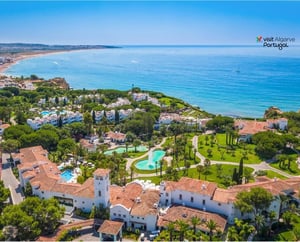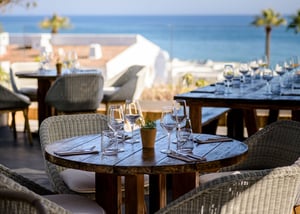Brexit: British Nationals Living in Portugal
How will Brexit affect you? Checklist for Brits living in Portugal
Book Top Experiences and Tours in Algarve:
If youʻre booking your trip to Algarve last minute, we have you covered. Below are some of the top tours and experiences!- Portimão: Benagil Caves Speed Boat Tour with Sunset Option
- Albufeira: Full-Day Buggy Tour with Lunch
- Faro: Ria Formosa Natural Park Segway Tour & Birdwatching
- Algarve: Horse Riding Beach Tour at Sunset or Morning
- From Albufeira: Half-Day Off-Road Quad Tour
The Brexit vote was the biggest democratic exercise in British history and, whether or not you believe that UK voters were provided with all the facts necessary to make an informed choice â âstayâ or âleaveâ, the result of the EU Referendum held on 23 June 2016, revealed that the majority had voted in favour of withdrawing from the EU.
On 29 March 2019, the UK was set to leave the European Union. However, if have been following the recent events in Westminster and Brussels, you will be aware that a Brexit extension was agreed. The extension period approved is for "only as long as is necessary" and "no longer than 31 October", to allow for the ratification of the withdrawal agreement. The new deadline of 31 October averted the prospect of the UK having to leave the EU without a deal on 29 March, but the extension comes with a proviso that the UK must hold European elections in May, or leave on 1 June without a deal.
At present, is still looks as though the UK will leave the EU in the not-too-distant future and, as a British citizen living in an EU country, you may be concerned about the potential impact of Brexit on your future. Youâre not alone! As of May 2018, there were 484,975 UK State Pensioners resident elsewhere in the European Economic Area (EEA) or Switzerland. Of these, there were 468,813 residing in the European Union, over 50,000 of whom were living here in Portugal. Conversely, there are around 400,000 Portuguese nationals living in the UK.
While nothing in life or Brexit is certain, as an expat living in Portugal, there are steps you can take to secure your residency and associated benefits.
Checklist for Brits living in Portugal
Residency
If you are an EU/EEA national and you live in Portugal for more than three months of the year (90 days), you are required to apply for a residency certificate from your local town hall â the Câmara Municipal. This certificate allows you to live and work in Portugal and gives you the same rights to benefits and healthcare as Portuguese citizens.
At some point in the Brexit process, you may need to prove that you are resident in Portugal, so make sure that you are legally registered with the Portuguese authorities: ; in light of the Brexit extension, if you didnât manage to register before 29 March, thereâs still time
Following at least five years of continuous legal residence, you can apply for permanent residency through SEF (Serviço de Estrangeiros e Fronteiras). Permanent residency cards need to be renewed every 10 years. After six years of legal residency, you can, if you wish, apply for Portuguese nationality: Portugal permits dual citizenship, so you wonât have to give up your UK passport. SEF have recently extended their contact centre opening hours - they now operate from 8am to 8pm.
Both now and after Brexit, expats who have settled in Portugal, may be joined by existing spouses/partners and close family members. It hasnât yet been agreed whether Brits living in Portugal will have the automatic right to move to another EU country post-Brexit.
You can find more information about registering your residency here.
Healthcare
Once you have registered your residency in Portugal, you are entitled to state healthcare. You may join the state healthcare scheme (SNS) by taking your residency certificate and passport to your local health centre (Centro de Saúde), where you will be issued with a health number (Número de Utente).
If you receive an âexportable benefitâ from the UK, such as a pension, you may need an S1 form (certificate of entitlement) issued by the UK. There is more information available about healthcare in Portugal and the S1 form on the NHS website.
After Brexit, If there is a deal, your current rights on access to healthcare in Portugal will remain the same as long as you remain a resident in Portugal.
After Brexit, If thereâs no deal and you are registered for healthcare based on your residency, or you receive cover through the S1 form, you will not lose access to healthcare. Information on access to healthcare is regularly updated on the UK.GOV website - check here for the latest news.
In Portugal you can opt for private healthcare or use the state healthcare system. There is a growing number of private healthcare providers in the Algarve offering a wide range of general and specialist health services and you do not need a health number (nº de utente) to access these as you pay for each service. The state healthcare system, just as with state healthcare in other countries, can at times be slower than one might wish, but in general, the services available and level of care is more than acceptable and the rates charged are a fraction of the private healthcare services. English speaking health care personnel can be found in both the private and the public systems.
Pensions and NI Contributions
If you are a UK national living in an EU country such as Portugal, you will continue to receive your state pension post-Brexit. The British government has also confirmed that it intends to uprate pensions â in other words, as an expat, you will still receive the annual state pension increase after the UK leaves the EU*.
In countries where there is a social security agreement with the UK â Portugal is such a country â the National Insurance (NI) contributions that you make while living in Portugal will also continue to count towards your UK state pension. There is more information on the UK state pension, your UK state pension entitlement and NI contributions here.
If you currently receive, or hope to receive in the future, a private occupational pension from the UK, payment should not be affected by the UKâs withdrawal from the EU: There is nothing in UK private occupational pensions legislation that prevents occupational pension schemes from making pension payments overseas. However, with the many options now available for accessing your private pension funds, itâs probably worth speaking to a financial services professional who can advise you on the tax implications.
*In the event of a âno dealâ exit the British government has committed to uprate across the EU in 2019 to 2020 and has stated: âWe would wish to continue uprating pensions beyond that but would take decisions in light of whether, as we would hope and expect, reciprocal arrangements with the EU are in place.â Ref: www.gov.uk - UK nationals in the EU: benefits and pensions in a âno dealâ scenario.
Taxation
If you are one of the many Brits who have chosen to make Portugal their home, buying property in the Algarve or setting up a holiday home here, it is important to ensure that you are paying the right taxes in the right country. The general rule is that if you spend 183 days or more in Portugal within a 12 month period, you are considered âtax residentâ and liable to Portuguese taxation on your worldwide income. However, itâs not always quite that simple, as a number of factors can affect your tax liability. In fact, if you are a new resident in Portugal, you may be eligible for the âNon-Habitual Residentâ (NHR) scheme that allows new residents special tax benefits during their first ten years in the country. These tax benefits have enticed many new residents to Portugal, particularly to the Algarve.
You will need a Portuguese tax number (Número de Contribuinte / NIF) to pay your taxes, as well as to do things like buy a property or a car, open a bank account or sign long-term rental agreements. You can obtain a tax number from your local tax office (Finanças).
Itâs wise to consult an expert who fully understands the Portuguese tax system: All Finance Matters, based in Tavira, offers a full range of tax and accountancy services, including a business start-up consultancy. Algarve Assistants in Faro can help you with all aspects of taxation, plus they can assist you in registering your UK plated vehicle here in Portugal as well as many other bureaucratic matters. For an holistic approach to financial planning, Blevins Franks offers tax advice and planning as well as estate planning, pensions and investment strategies.
Driving licences
Currently, UK issued driving licences are valid in Portugal until their expiry date. If you hold a valid UK licence you may drive for both work and leisure purposes throughout Portugal and other EU countries, without having to obtain supporting documentation.
It is also the case currently, that if you are resident in Portugal, you are required to register your UK licence with the Portuguese authorities. Or, you can opt to exchange your UK licence for a Portuguese licence, without having to retake a driving test.
So what about post-Brexit? New information was published by Portugalâs Institute of Motor Transport (IMT) in April this year, which states that UK Nationals who are resident in Portugal on the day the UK leaves the EU will have until 31 December 2020 to exchange their driving licences under the current EU regulations. Even if the UK exits without a deal UK nationals and their family members, who are resident in Portugal on the day the UK leaves the EU, will have until 31 December 2020 to exchange their driving licences under the procedures applicable to third countries. In addition, the IMT document explains that UK Nationals who move to Portugal after the UK has left the EU will have 90 days, from the date they are granted residence, to exchange their driving licences without having to retake a driving test in Portugal.
If you are resident in Portugal and havenât already exchanged your licence via the IMT, it is advisable to do so before Brexit. Certainly, if you have already registered your UK licence with the IMT, you should exchange it, as they will be considered âthird country driving licencesâ post-Brexit.
Brits visiting Portugal after the UKâs exit from the EU will be able to drive in Portugal for a maximum of 185 days without having to carry an International Driving Permit.
Click here to read and download the latest information published by the IMT. From this page, select the link âInformation on recognition and exchange of driving licences after BREXITâ - this information is available in English.
NB. If you exchange your UK licence for a Portuguese licence, post-Brexit you will be still be able to drive in other EU countries and in the UK without an IDP, and you will be able to re-exchange your Portuguese licence for a UK licence if you return to live in the UK.
Visit www.gov.uk for the latest information on driving in the EU.
Click here for more information on driving in Portugal.
Wills
While not directly linked to Brexit, itâs important to make sure that your assets in both the UK and Portugal will be passed on to your chosen beneficiaries: forced heirship rules in Portugal mean that your assets are passed within your bloodline when you die. The EU regulation in force since 17 August 2015 (Brussels IV) allows an individual to elect, via his/her will, for the succession laws of his/her country of nationality to apply on his/her death. As the UK did not opt into the regulation in the first place, it is already considered a âthird stateâ for the purposes of this regulation, so it will still apply to UK nationals with assets in an EU country post-Brexit.
There are companies in the Algarve that can assist you in preparing a Portuguese Will. Faro-based lawyer, Paula Canavarro, provides legal services in the Algarve, with expertise in real estate transactions, corporate law, probate, wills and family law.
With Brexit looming, Portugal is a good place to be living - the UK has a long-standing alliance with Portugal that dates back to the Middle Ages that is remembered and recognised today. While the storm clouds of Brexit understandably cast a shadow, British nationals living in the Algarve can be sure of plenty of sunny days ahead.
Note: The information provided in this article was correct at time of publishing, but may have been updated since.
For more information please see the UK Government information, follow the British Embassy in Portugal facebook page or contact the British Vice Consulate to the Algarve, located in Portimão.
YOU MIGHT ALSO FIND THESE PAGES HELPFUL
- Algarve Expat Guide
- Move to Portugal for Tax Free Foreign Pensions
- Top 10 Reasons to Retire to the Algarve
- Make the Algarve your Home
- Top Tips for Buying and Selling Algarve Property
- Capital Gains Tax and your property in Portugalâ
- Starting a Business in Portugal - what you need to know
- Services in the Algarve
- Financial Services in the Algarve
- FAQs About Algarve












































